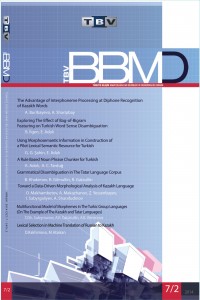Öz
Morphological units carry vast amount of semantic information for languages with rich inflectional and derivational morphology. In this paper we show how morphosemantic information available for morphologically rich languages can be used to reduce manual effort in creating semantic resources like PropBank and VerbNet; to increase performance of word sense disambiguation, semantic role labeling and related tasks. We test the consistency of these features in a pilot study for Turkish and show that; 1) Case markers are related with semantic roles and 2)Morphemes that change the valency of the verb follow a predictable pattern.
Kaynakça
- [1] Ana-Maria Giuglea and Alessandro Moschitti. 2006. Semantic Role Labeling via FrameNet, VerbNet and PropBank. Proceedings of the 21st International Conference on Computational Linguistics, pp. 929-936. 2006.
- [2] K. Schuler 2006. VerbNet: A BroadCoverage, Comprehensive Verb Lexicon PhD diss., University of Pennsylvania
- [3] Martha Palmer, P Kingsbury, and D Gildea. 2005. The Proposition Bank: An Annotated Corpus of Semantic Roles. Computational Linguistics, 31(1):71–106
- [4] Orhan Bilgin, Ozlem Çetinoğlu and Kemal Oflazer. 2004. Building a wordnet for Turkish. Romanian Journal of Information Science and Technology, 7.1-2 (2004): 163-172.
- [5] Gülşen Eryiğit, Tugay Ilbay, Ozan A. Can. 2011. Multiword Expressions in Statistical Dependency Parsing. In Proceedings of the Workshop on Statistical Parsing of Morphologically-Rich Languages SPRML at IWPT, Dublin.
- [6] Kemal Oflazer, Bilge Say, Dilek Z. HakkaniTür, Gökhan Tür. 2003. Building a Turkish Treebank. Invited chapter in Building and Exploiting Syntactically annotated Corpora, Anne Abeille Editor, Kluwer Academic Publishers
- [7] Nart B. Atalay, Kemal Oflazer, Bilge Say. 2003. The Annotation Process in the Turkish Treebank. In Proceedings of the EACL Workshop on Linguistically Interpreted Corpora - LINC, Budapest, Hungary
- [8] Geoffrey Haig. 1998. Relative Constructions in Turkish. Otto Harrassowitz Verlag., ISBN 3447040041, (1998)
- [9] Joan L. Bybee. 1985. Morphology: A Study of the Relation between Meaning and Form. Typological Studies in Language 9 Amsterdam, Philadelphia: Benjami
- [10] Yeşim Aksan, Mustafa Aksan 2012. Construction of the Turkish National Corpus (TNC). (LREC 2012). Istanbul.
- [11] Jinho D. Choi, Claire Bonial, and Martha Palmer. 2010. Propbank Frameset Annotation Guidelines Using a Dedicated Editor, Cornerstone. (LREC 10), Valletta, Malt
Öz
Kaynakça
- [1] Ana-Maria Giuglea and Alessandro Moschitti. 2006. Semantic Role Labeling via FrameNet, VerbNet and PropBank. Proceedings of the 21st International Conference on Computational Linguistics, pp. 929-936. 2006.
- [2] K. Schuler 2006. VerbNet: A BroadCoverage, Comprehensive Verb Lexicon PhD diss., University of Pennsylvania
- [3] Martha Palmer, P Kingsbury, and D Gildea. 2005. The Proposition Bank: An Annotated Corpus of Semantic Roles. Computational Linguistics, 31(1):71–106
- [4] Orhan Bilgin, Ozlem Çetinoğlu and Kemal Oflazer. 2004. Building a wordnet for Turkish. Romanian Journal of Information Science and Technology, 7.1-2 (2004): 163-172.
- [5] Gülşen Eryiğit, Tugay Ilbay, Ozan A. Can. 2011. Multiword Expressions in Statistical Dependency Parsing. In Proceedings of the Workshop on Statistical Parsing of Morphologically-Rich Languages SPRML at IWPT, Dublin.
- [6] Kemal Oflazer, Bilge Say, Dilek Z. HakkaniTür, Gökhan Tür. 2003. Building a Turkish Treebank. Invited chapter in Building and Exploiting Syntactically annotated Corpora, Anne Abeille Editor, Kluwer Academic Publishers
- [7] Nart B. Atalay, Kemal Oflazer, Bilge Say. 2003. The Annotation Process in the Turkish Treebank. In Proceedings of the EACL Workshop on Linguistically Interpreted Corpora - LINC, Budapest, Hungary
- [8] Geoffrey Haig. 1998. Relative Constructions in Turkish. Otto Harrassowitz Verlag., ISBN 3447040041, (1998)
- [9] Joan L. Bybee. 1985. Morphology: A Study of the Relation between Meaning and Form. Typological Studies in Language 9 Amsterdam, Philadelphia: Benjami
- [10] Yeşim Aksan, Mustafa Aksan 2012. Construction of the Turkish National Corpus (TNC). (LREC 2012). Istanbul.
- [11] Jinho D. Choi, Claire Bonial, and Martha Palmer. 2010. Propbank Frameset Annotation Guidelines Using a Dedicated Editor, Cornerstone. (LREC 10), Valletta, Malt
Ayrıntılar
| Diğer ID | JA37MJ37RC |
|---|---|
| Bölüm | Makaleler(Araştırma) |
| Yazarlar | |
| Yayımlanma Tarihi | 21 Aralık 2014 |
| Yayımlandığı Sayı | Yıl 2014 Cilt: 7 Sayı: 2 |
Kaynak Göster
https://i.creativecommons.org/l/by-nc/4.0Makale Kabulü | |
Çevrimiçi makale yüklemesi yapmak için kullanıcı kayıt/girişini kullanınız. Dergiye gönderilen makalelerin kabul süreci şu aşamalardan oluşmaktadır: 1. Gönderilen her makale ilk aşamada en az iki hakeme gönderilmektedir. 2. Hakem ataması, dergi editörleri tarafından yapılmaktadır. Derginin hakem havuzunda yaklaşık 200 hakem bulunmaktadır ve bu hakemler ilgi alanlarına göre sınıflandırılmıştır. Her hakeme ilgilendiği konuda makale gönderilmektedir. Hakem seçimi menfaat çatışmasına neden olmayacak biçimde yapılmaktadır. 3. Hakemlere gönderilen makalelerde yazar adları kapatılmaktadır. 4. Hakemlere bir makalenin nasıl değerlendirileceği açıklanmaktadır ve aşağıda görülen değerlendirme formunu doldurmaları istenmektedir. 5. İki hakemin olumlu görüş bildirdiği makaleler editörler tarafından benzerlik incelemesinden geçirilir. Makalelerdeki benzerliğin %25’ten küçük olması beklenir. 6. Tüm aşamaları geçmiş olan bir bildiri dil ve sunuş açısından editör tarafından incelenir ve gerekli düzeltme ve iyileştirmeler yapılır. Gerekirse yazarlara durum bildirilir.
|



